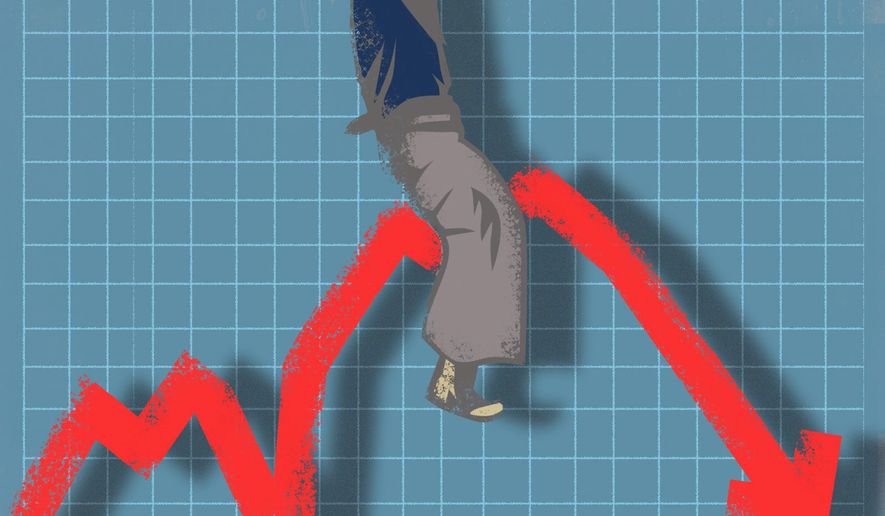OPINION:
The American economy and stock prices have been hit by a triple whammy. A pandemic that shut the economy, squabbling between the White House and Democrats in Congress about additional stimulus to boost the recovery and the caldron of racial tensions, violence in major cities and prospects for a contested election.
The business shutdowns required by COVID-19 pushed down GDP by 31% on an annualized basis in the second quarter. The economy substantially, but hardy completely, rebounded in the third quarter, thanks to a huge stimulus spending and lending support from the Federal Reserve. However, the likelihood of further assistance until after the election is fading.
After rising about 4.4% from the end of 2019, the S&P 500 Index dropped 34% from February to March. Supported by Fed asset purchases and loans, equities recovered by August. In this digital age, bear markets and recoveries happen at the pace of computer games, not bocce ball.
Individual investors didn’t panic, stuck the course and avoided the temptation to try to time the market. Especially those that stuck to broad index funds and ETFs, while keeping an emergency reserve in cash and fixed income securities.
Corporate profits took a hit but investors appear focused on the recovery and the stimulus Biden administration spending could bring. FiveThirtyEight places the odds of Mr. Biden winning at better than 80% and the Democrats gaining control of the Senate at better than 65%.
With millions more casting ballots by mail and Democrats more likely to use that option than Republicans, we still may not have a clear winner for several weeks after Nov. 3. Considerable turmoil and urban unrest could ensue while mail-in ballots are counted and litigated and a winner is finally certified.
Investors appear sanguine that the worst of Mr. Biden’s tax and spending proposals won’t happen. Except for the very wealthy, we are likely facing personal and capital gains tax rates in line with the Obama era, and corporate taxes raised to 28% — not the 35% that prevailed prior to President Trump.
Taxing capital gains at death and significantly higher estate taxes are not likely together. The debate about fairness will shift to the impacts on family businesses. The Democrats enjoy substantial support among college educated voters, who are stock investors, and in the high-tech and financial sectors. Those make pushing death and capital gains taxes too far a circular firing squad.
Mr. Biden is not terribly likely to effectively assuage Black Lives Matter — the more Mr. Biden gives in, the more it will demand — but he should be able to rally mayors in Democratic cities to stop undermining police and put down urban violence.
The economy will take several years to fully heal, but while this is a sad note for inequality, the business failures are disproportionately concentrated among small businesses. In the corporate sector, losses in retailing, hospitality, amusements and motion picture producers are mirrored by gains elsewhere. Factset has year-over-year corporate profits rising by 44% in the second quarter.
Currently, the S&P 500 is selling for 36 times earnings. That is well above the 25-year moving average of 26 and implies an equivalent interest rate of 2.8%.
However, the 10-year Treasuries yield is about 0.8%. That’s well below the historical average and the Federal Reserve is committed to keeping interest rates low. As stocks compete with bonds, this implies a sustainable price-earnings ratio consistent closer to 30 or 35.
Gold has done exceptionally well this year, but its price is much more volatile than stocks. Once all the drama of election-year politics passes, don’t look for more big gains there.
Overinvesting in real estate is a poor solution, too. Over the past 25 years, the average return on residential real estate in the 10-largest metro areas was 4.5%. Including dividends, it was 11.8% for the S&P 500.
Should Mr. Trump again pull a rabbit out of the hat, he will cut taxes next year. If Mr. Biden wins, he will spend more on green initiatives, expanded health care and the like.
Either would boost the economy, and a 44% jump in corporate earnings would imply a price-earnings ratio for the S&P 500 of 23. Stocks will be terribly undervalued once we have a vaccine and the recovery goes into its next phase.
Investors should look beyond the turmoil of the next few months and stick with stocks.
• Peter Morici, @pmorici1, is an economist and emeritus business professor at the University of Maryland, and a national columnist.




Please read our comment policy before commenting.